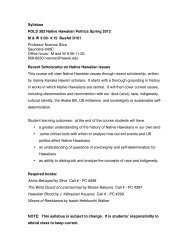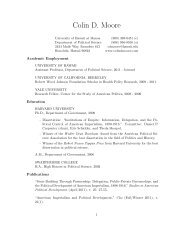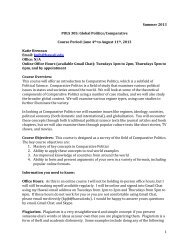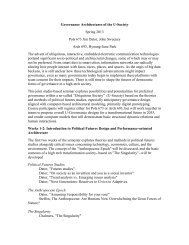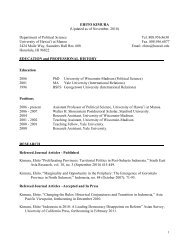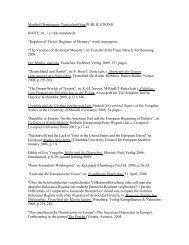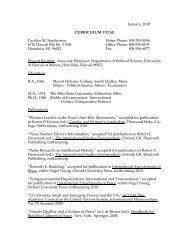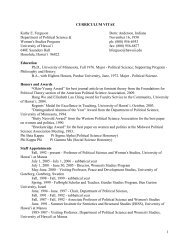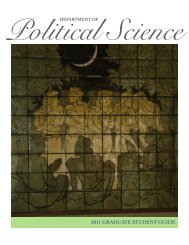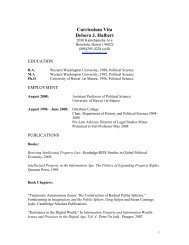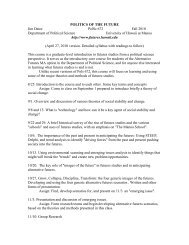syllabus - Department of Political Science
syllabus - Department of Political Science
syllabus - Department of Political Science
Create successful ePaper yourself
Turn your PDF publications into a flip-book with our unique Google optimized e-Paper software.
POLS 404 Senior Thesis<br />
Wednesday 1:30 – 4:00pm<br />
Saunders 624<br />
Pr<strong>of</strong>essor: Dr. Hokulani K. Aikau<br />
E-mail: aikau@hawaii.edu (this is the best way to contact me as I check email several<br />
times a day.)<br />
Office Hours: Monday 1:30 – 3:30; by appointment<br />
Office: 611 Saunders Hall<br />
Office Phone: 956-8171<br />
Course Description:<br />
POLS 404 is a capstone course for <strong>Political</strong> <strong>Science</strong> majors but is open to all students interested<br />
in pursuing an individual research project related to political science. This course is intended to<br />
walk students through the process <strong>of</strong> writing a senior thesis, starting with finding a topic,<br />
conducting original research, building an argument, and writing an article length original<br />
research paper. This course does not prepare students to confront methodological issues related<br />
to knowledge production, approaches to research, or ethical issues; this should have been done in<br />
POLS 390. Rather, students will work with the instructor, fellow students, as well as in<br />
conjunction with a faculty mentor on the technical steps <strong>of</strong> conceptualizing, designing and<br />
producing an original research paper.<br />
Learning Objectives:<br />
• Students will know how to design and execute an original research project.<br />
• Students will know how to construct a bibliography <strong>of</strong> primary and secondary<br />
sources.<br />
• Students will know how to construct an argument, use evidence to support their<br />
claim, and present their findings in written and oral formats.<br />
Required Readings: Books can be purchased from Oliver Lee or on-line.<br />
Kate L. Turabian. 2007. A Manuel for Writers <strong>of</strong> Research Papers, Theses, and Dissertations, 7 th<br />
edition, Chicago, University <strong>of</strong> Chicago Press.<br />
Silvia, Paul J. 2007. How to Write a Lot: A Practical Guide to Productive Academic Writing. 1st<br />
ed. American Psychological Association (APA).<br />
Faculty Mentors:<br />
Each student is required to identify a faculty mentor who will help the student navigate the<br />
literature in their particular field. The Faculty Mentor will help the student develop a<br />
comprehensive reading list for their literature review, advise them on methods, and read and<br />
provide feedback on early drafts <strong>of</strong> the thesis. The Faculty Mentor will be asked to evaluate the<br />
student’s progress over the semester and to <strong>of</strong>fer a narrative evaluation <strong>of</strong> the first draft <strong>of</strong> the<br />
thesis. Faculty Mentors will be invited to presentations at the end <strong>of</strong> the semester. Final grades<br />
will be determined by the instructor.
Course Requirements:<br />
1. Participation, Peer Review and Attendance: 20%<br />
In many ways researching and writing a paper can be a solitary endeavor however it is also<br />
inherently collaborative. We build on the ideas and research <strong>of</strong> others, and when we write,<br />
we aim to persuade, educate, enlighten, entertain, and perhaps unsettle a specific audience.<br />
Over the course <strong>of</strong> the semester, therefore, we will devote a great deal <strong>of</strong> attention to<br />
exchanging ideas and evaluating each other’s work. In addition to attending classes regularly,<br />
you must also be prepared to either present on your research and/or being prepared to <strong>of</strong>fer<br />
constructive feedback on your classmates’ work. This course is worth 6 credit hours,<br />
however only three <strong>of</strong> those hours will be filled in class once a week. Please note: Each<br />
student is given 1 free absence; each additional absence will result in a deduction <strong>of</strong> 5%<br />
from your participation grade. If you miss four (4) or more class sessions, you will get a<br />
zero for your participation grade. Repeated tardiness will count as an absence. Please see<br />
me if there are extenuating circumstances that prevent you from making it to class on time.<br />
During the process <strong>of</strong> discussion differences in opinion may arise so it is extremely important<br />
to be courteous and respectful <strong>of</strong> each other in all <strong>of</strong> our discussions.<br />
2. Weekly Blog Posts: 5%<br />
Research is a process that is best done in collaboration with others. I have created a class<br />
blog, which will allow us to maintain communication when we are not in class. As a 6 credit<br />
course, the blog will also serve as additional contact hours. Each week you will be expected<br />
to post a meaningful update, question, discussion topic, etc. and comment on the posts<br />
created by your classmates. In a separate handout, I will provide you with a rubric that<br />
summarizes my expectations.<br />
3. Paper Proposal: 5%<br />
A research proposal provides a kind <strong>of</strong> road map or itinerary for your research journey. As<br />
such, it establishes your initial expectations while also being flexible, changing as your plans<br />
change. Additionally, your proposal will provide your faculty mentor with an idea <strong>of</strong> your<br />
plans for the semester and can help guide your discussion you will have with her or him<br />
about developing a bibliography and ensuring that your methods are appropriate. Your paper<br />
proposal will be due . We will workshop them in class on Jan. and you will have an<br />
opportunity to revise it before sharing it with your faculty mentor.<br />
4. Master/Annotated Bibliography: 10%<br />
The success <strong>of</strong> your research paper not only relies on the clarity <strong>of</strong> your argument and the<br />
quality <strong>of</strong> your prose but on the depth and sophistication <strong>of</strong> your research. After spending<br />
several weeks conducting research, your bibliography will serve as the ship’s log <strong>of</strong> your<br />
journey. In most cases, it will consist <strong>of</strong> two parts: First, an exhaustive inventory <strong>of</strong><br />
secondary sources you have consulted related to your topic; and second, a tightly focused list<br />
<strong>of</strong> primary sources which will serve as evidence to support your claim. Your master<br />
bibliography, which will include annotations <strong>of</strong> 10 key sources, is due.<br />
By the time you submit your preliminary bibliography, you should have a clear<br />
understanding <strong>of</strong> what others have said about your topic (or related topics) and what<br />
theoretical and methodological approaches best suit your purposes. Most importantly, you
should have narrowed down your own research so that you are working closely with a<br />
discrete set <strong>of</strong> primary materials—historical archives, first-hand interviews, newspaper<br />
articles, films, images, songs, etc. Please note that your bibliography must conform to The<br />
Chicago Manuel <strong>of</strong> style (See Turabian for guidelines).<br />
Annotations are not summaries. Rather they should to include the following:<br />
1) Identify the author’s main argument, including the author’s claim/thesis statement, the<br />
reasons that support their claim, and the evidence they will use to support their reasons;<br />
2) Offers a concise critique <strong>of</strong> the overall book/article;<br />
3) Includes one or two sentences that evaluate the authority or background <strong>of</strong> the author,<br />
4) Explain how this book, article, etc. intersects with your thesis/research topic.<br />
You may also find these websites helpful:<br />
http://owl.english.purdue.edu/owl/resource/614/01/<br />
http://www.library.cornell.edu/olinuris/ref/research/skill28.htm<br />
5. Detailed Outline (with sample analysis <strong>of</strong> one primary source) (5 pages minimum): 10%<br />
For some <strong>of</strong> you, this paper may be longer that you are accustomed to writing. In addition to<br />
having an opportunity to develop a concept map <strong>of</strong> the argument <strong>of</strong> your paper, you will use<br />
your map to develop a detailed outline. The outline will help you organize your argument in<br />
a structured, clear way. This outline can be in any form, but must contain enough detail to be<br />
able to communicate how the parts <strong>of</strong> your argument fit together. You will also include an<br />
analysis <strong>of</strong> one <strong>of</strong> your chosen primary sources (2 pages – included in final page count), and<br />
it must be located where you think it belongs in the outline. Your outline will be due.<br />
6. Introduction: 5%<br />
As in life, first impressions matter in scholarship. Your introduction needs to capture the<br />
reader’s interest, have a clearly identified puzzle or problem the project engages, research<br />
questions, a claim, reasons for asserting that claim, alternative perspectives that will be<br />
presented, and the evidence used to support you reasons. It is also useful to include a<br />
roadmap for the rest <strong>of</strong> the paper. These demands make introductions exceedingly difficult to<br />
write, so go easy on yourself. Devising an introduction that finally works generally requires<br />
several drafts. You may find you have to try out and discard various approaches, and some <strong>of</strong><br />
your arguments or interpretations won’t become entirely clear until you’ve completed your<br />
rough draft. When you submit your introduction for class review, it will not be the final draft.<br />
Nonetheless, try to make it as compelling, clear, and as complete as possible. The first draft<br />
<strong>of</strong> your introduction will due .<br />
7. First Full Draft (20 pages): 20%<br />
A first draft is just that, a draft. However, in order to be useful, you should try to submit a full<br />
version <strong>of</strong> your paper that you regard as close to final. It should be fully referenced, concisely<br />
and clearly written, and carefully edited. This will allow your peer editors and faculty mentor<br />
to make the most insightful and useful suggestions possible. Drafts will be due . You will<br />
submit your draft to your research group and your faculty mentor. Your research group will<br />
give you electronic feedback on your draft. You should make an appointment to meet with<br />
your faculty mentor to discuss the draft.
8. Presentation <strong>of</strong> Research: 5%<br />
You have done amazing work this semester and now its time to show it <strong>of</strong>f. You will give a<br />
public presentation that synthesizes the research you have conducted this semester. It is an<br />
opportunity to share your work with a larger audience. Your presentation will be 15 minutes<br />
and should build from your draft and give the audience a brief synopsis <strong>of</strong> what you’ve<br />
learned from doing this research. You will invite your faculty mentor to attend and will thank<br />
them for their time and mana‘o this semester.<br />
9. Final Draft (20 pages): 20%<br />
You are almost to the finish line. The completion <strong>of</strong> your final paper marks the culmination<br />
<strong>of</strong> all your effort over the course <strong>of</strong> the semester (and as a <strong>Political</strong> <strong>Science</strong> major). It should<br />
be original, tightly focused, well-researched, convincingly argued, skillfully written, logically<br />
organized, and extensively referenced. It should take into account the editorial suggestions <strong>of</strong><br />
your peers, the pr<strong>of</strong>essor, and mentor, and should be based on extensive revisions. Please<br />
submit the best possible paper that you can, one you can submit for publication or use for a<br />
writing sample in pr<strong>of</strong>essional school, graduate school and job applications.<br />
Grading Procedures:<br />
Below is a general written description <strong>of</strong> how I determine grades.<br />
A Achievement outstanding relative to the level necessary to meet course requirements<br />
B Achievement significantly above the level necessary to meet course requirements.<br />
C Achievement meeting the minimum course requirements.<br />
D Achievement worthy <strong>of</strong> credit even though it does not fully meet the basic course<br />
requirements in every respect.<br />
F Performance failing to meet the basic course requirements<br />
Grade Breakdown: Your grade will be based on the +/- system.<br />
A 100% - 93%<br />
A- 90%<br />
B+ 86.49%<br />
B 82.49%<br />
B- 80%<br />
C+ 76.49%<br />
C 72.49%<br />
C- 70%<br />
D+ 66.49%<br />
D 62.49%<br />
D- 60%<br />
F 59% - 0 %<br />
In-class informal presentations, workshops, and other activities:<br />
√ + (check plus) = excellent work;<br />
√ (check) = ok work;<br />
√ – (check minus) = poor work.
Late Work: All work should be completed on time. If students have special circumstances that<br />
prevent them from turning in an assignment on time PRIOR arrangements must be made. A<br />
paper is late if it is not turned in by the end <strong>of</strong> class <strong>of</strong> the assigned due date. Late papers will be<br />
marked down by 1/3 <strong>of</strong> a grade for every day it is late (i.e. from an A- to a B+). After a week the<br />
paper will receive zero points.<br />
No incompletes will be given for this course unless there are extenuating circumstances in which<br />
case a contract must be drawn up with a plan for completion.<br />
Academic Dishonesty: It is the responsibility <strong>of</strong> the student to be aware <strong>of</strong> and in compliance<br />
with the university’s policies regarding academic dishonesty. Any academic dishonesty such as<br />
plagiarism is taken seriously (see policy below).<br />
Reasonable Accommodation Policy: If you feel you need reasonable accommodations because<br />
<strong>of</strong> the impact <strong>of</strong> a disability, please 1) contact the KOKUA Program (V/T) at 956-7511 or 956-<br />
7612 in room 013 <strong>of</strong> QLCSS; 2) speak with me privately to discuss your specific needs. I will be<br />
happy to work with you and the KOKUA Program to meet your access needs related to your<br />
documented disability.
Course Schedule<br />
(subject to change)<br />
Date Topic Assignments, Readings,<br />
Tasks<br />
Week 1: Introductions: Getting to know each other,<br />
and introduction to Zotero, overview <strong>of</strong> the<br />
components <strong>of</strong> a research paper<br />
READ: Turabian Ch. 1-2<br />
Week 2: Jan 16<br />
Week 3: Jan 23<br />
(Library Visit)<br />
* In-Class: Workshop: Topic Statements,<br />
Research Questions, Hypothesis<br />
Time Management: The significance <strong>of</strong> a<br />
schedule and how to write a lot!<br />
* In-Class establish individual writing<br />
schedules and accountability/writing<br />
groups; Discuss research proposal<br />
*In-Class: Workshop Research Proposal;<br />
Establish Research plan for the semester;<br />
Discuss Kinds <strong>of</strong> Sources (Primary vs.<br />
READ: Silvia—entire book<br />
*Identify possible Faculty<br />
Mentor; How to Make “First<br />
Contact”<br />
READ: Research Proposals;<br />
prepare for workshop<br />
Secondary) and Managing Information. Due: Research Proposal<br />
Week 4: What is a Literature Review? READ: Kn<strong>of</strong>f “What is a<br />
Literature Review?”<br />
*Meet with Faculty Mentor to<br />
discuss proposal and begin<br />
work on master bibliography<br />
Week 5: *In-Class: Revised Schedule & Individual Set goals for the Week<br />
Progress Report<br />
Week 6: *In-Class: Individual Progress Report on<br />
Research and Bibliography<br />
Due: Master/Annotated<br />
Bibliography<br />
Week 7: Planning your Argument Turabian Ch. 5<br />
In-Class: Concept Map Your<br />
Argument<br />
Week 8:<br />
Planning your first Draft<br />
* In-Class: Workshop Outlines, Discuss the<br />
role <strong>of</strong> Introductions and Conclusions<br />
READ: Turabian Ch. 6-7, 9<br />
Due: Outline<br />
Week 9: * In-Class: Workshop the Introduction Due: Introduction<br />
(Peer/Pr<strong>of</strong>essor Review)<br />
Week 10: *In-Class: Progress Report and Goal Setting<br />
Week 11:<br />
*Check in With<br />
Accountability Group<br />
Week 12:<br />
Due: First Full Draft (share a<br />
copy with your Faculty<br />
Mentor)<br />
Week 13: *In-Class: Workshop rough drafts, tips for Bring to class: Peer reviews <strong>of</strong>
evising your draft and preparing for your first draft.<br />
presentations<br />
Week 14: Student Presentations Group 1 (Invite Faculty<br />
Mentors)<br />
Week 15: Student Presentations Group 2 (Invite Faculty<br />
Mentors)<br />
Week 16: Final Papers Due


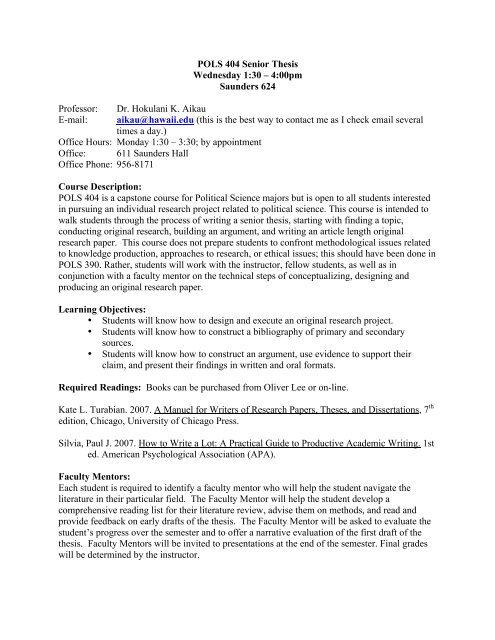
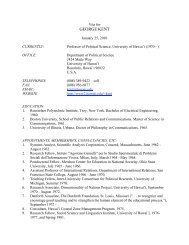
![Fall 2012 POLS 620 Syllabus [PDF] - Department of Political Science](https://img.yumpu.com/25416938/1/190x245/fall-2012-pols-620-syllabus-pdf-department-of-political-science.jpg?quality=85)
